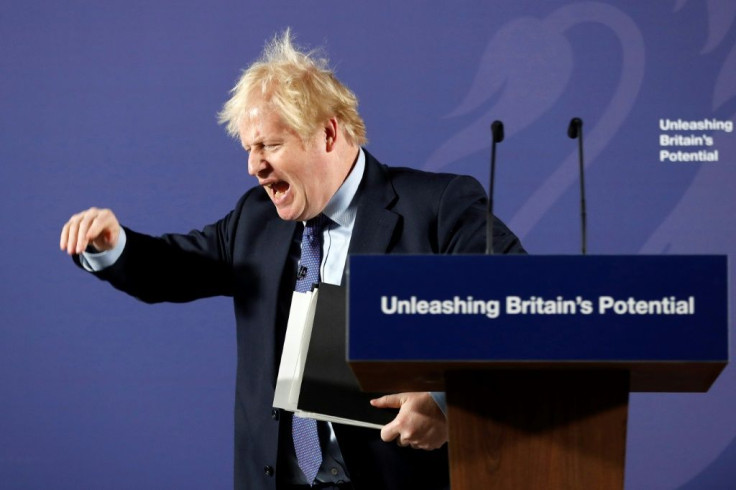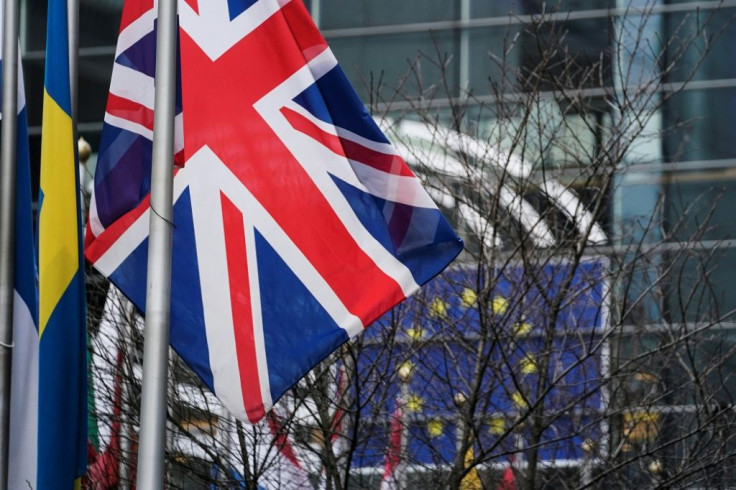Brexit Talks Turn Sour As EU, UK Clash

Britain and Brussels clashed Tuesday over upcoming Brexit talks, with London roundly rejecting key elements of the EU's negotiating platform, setting up an acrimonious start to negotiations next week.
The EU's chief negotiator warned the bloc would not abandon its principles to get a deal and took aim at a British minister as tensions between the two sides ramped up.
Prime Minister Boris Johnson's spokesman fired back, saying Britain would not cave to Brussels' demands for access to fishing waters or its insistence that British companies stick to EU standards on goods.
"We will not conclude an agreement at any price," Barnier told reporters after EU ministers approved his negotiating mandate, warning that negotiations would be "difficult, perhaps even very difficult".
The talks are to begin in Brussels on Monday in an increasingly poisonous atmosphere, with the clock ticking down to a December 31 deadline to reach a deal. Johnson has ruled out seeking any extension.
Britain left the EU at the end of January under the withdrawal agreement struck in late 2019, and will be regarded as a non-EU "third country" in the negotiations even though it still trades like an EU member until the end of December, when its transition period out of the bloc ends.
Without an accord on the new relationship, trade between the EU and Britain would revert to a bare-bones arrangement under WTO rules, causing economic pain on both sides, but especially in the UK.
Barnier's mandate emphasises that Britain has to mirror European standards if it wants its goods to continue to have tariff-free access to the huge single market, saying that any deal struck with the UK must include "robust commitments" to uphold norms.
Brussels fears that without these so-called "level playing field" guarantees, the UK might seek a competitive edge over Europe by undercutting its tax, environmental and labour standards.
But Downing Street rejected this in a series of tweets sent while Barnier was still on his feet in the press conference, saying the EU had offered the US zero tariffs "without the kind of level playing field commitments" seen in Tuesday's mandate.
And Johnson's spokesman insisted Britain "must have full control" of its laws, echoing earlier pledges to walk away rather than obey EU diktats.

Within hours of Barnier's mandate, British ministers in London approved their own negotiating approach.
Details are not due to be published until Thursday, but Johnson's spokesman said the goal was "to ensure we restore our economic and political independence on January 1, 2021" -- meaning Britain intends to set its own norms irrespective of EU rules.
France in particular hardened the EU position, aiming to heighten trade friction the more the UK diverges from EU standards, as well as putting access for EU fishing boats to British waters at the heart of the mandate.
The EU now wants any future deal to "uphold existing reciprocal access conditions" for fishing fleets, but this was swiftly shot down by Johnson's spokesman.
"Iit doesn't matter what the EU puts in its mandate as we become an independent coastal state on December 31 2020. That means we automatically take back control of our waters and others' right to fish in them," the spokesman said.
"We are prepared to have a discussion about who fishes in our waters but the point is we will be in control of those waters and it will be our determination to make."
While the two sides are clashing on substance, trust is dwindling as well, with Johnson's government saying British ports are not being readied to carry out checks on goods between Britain and its Northern Ireland territory, despite that being a requirement of the withdrawal agreement.
The normally unflappable Barnier singled out British Northern Ireland Minister Brandon Lewis over what he called "astonishing comments" suggesting there would be unfettered access for business between Northern Ireland and the UK mainland.
Under the withdrawal agreement, a protocol on Northern Ireland is to remain in place unless a devolved local government decides otherwise years down the line. Until then, the British territory is essentially to remain under EU single market rules, with a border for goods down the Irish Sea.
Irish Foreign Minister Simon Coveney warned that "the implementation of agreements that have already been struck are the test of good faith and trust -- and without good faith and trust, building a future relationship is not going to be easy".
For the future relationship, Britain is asking for a similar free trade agreement to the one Canada has with the EU, rejecting Europe's arguments that the UK's proximity, size and economic interconnectedness with the continent require stricter controls.
© Copyright AFP 2024. All rights reserved.





















